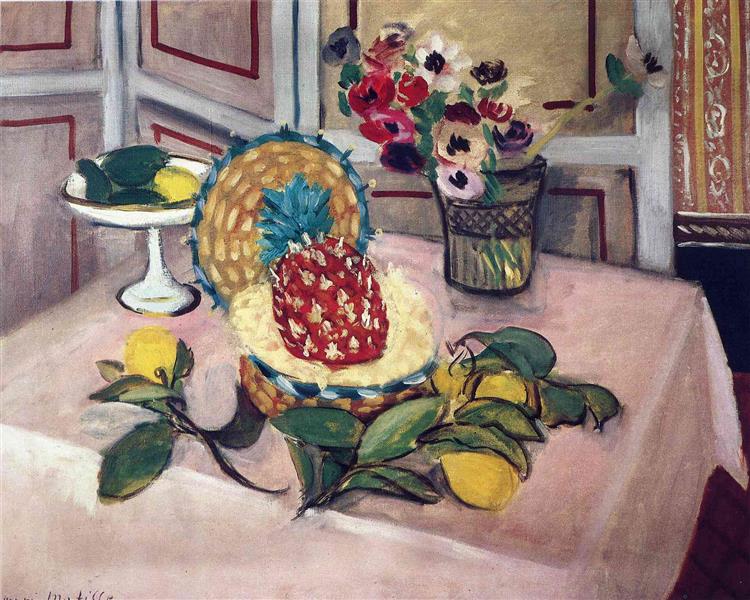Description
Henri Matisse, one of the greatest masters of modern art, delivers in "Still Life with Pineapples" from 1940 a work that distills his mastery in the use of color and composition. The painting, measuring 75x60 cm, belongs to the still life genre, a category that Matisse knew how to explore with a unique and revolutionary approach. In this creation, Matisse presents a scene that, at first glance, may seem simple, but which contains a complexity and vitality rarely achieved with so few elements.
The first aspect that captures us is the chromatic richness. Matisse was always an exceptional colorist, and in "Still Life with Pineapples" he demonstrates this in a compelling way. The vibrant and saturated colors create a visual symphony where the yellows of the pineapple stand out with an intensity that seems to transcend the canvas. This yellow, almost phosphorescent, contrasts exquisitely with the greens and blues of the background, generating a sense of depth and dynamism that is a trademark of Matisse's Fauvist style.
The composition of the work is no less impactful. The centralized pineapple serves as a focal point, guiding the viewer's gaze throughout the painting. Around the pineapple, Matisse arranges other domestic objects, each outlined with loose but controlled brushstrokes, providing a sense of movement and spontaneity. This arrangement seems almost improvised, but in reality, it follows precise rules of balance and harmony, essential characteristics in the artist's works. It is fascinating to observe how Matisse manages to make the objects in his painting interact with each other, creating a visual tension that constantly holds our attention.
Despite being a still life, "Still Life with Pineapples" is imbued with an almost human vitality. The absence of human figures does not detract from the life of the work; on the contrary, the treatment of the objects gives them a distinctive personality. Matisse's loose and confident strokes suggest an urgency and a passion for capturing the essence of things beyond their external appearance.
It is important to place this work in the historical context of its production. In 1940, the world was plunged into World War II, and Matisse, although not directly involved in the conflict, lived in a world of uncertainty and turmoil. This circumstance could explain the artist's desire to cling to beauty and luminosity in his works, as an act of resistance against the surrounding darkness. Through "Still Life with Pineapples," Matisse invites us to find refuge in the everyday, in light and color, proposing a kind of escapism that is as relevant today as it was in his time.
In conclusion, "Still Life with Pineapples" is not just a still life; it is a celebration of life and color that reflects the untimely genius of Henri Matisse. This work is a testament to how art can serve as a beacon of beauty and hope in times of adversity, and how apparent simplicity can contain a depth and complexity that are revealed only through attentive and prolonged observation.

